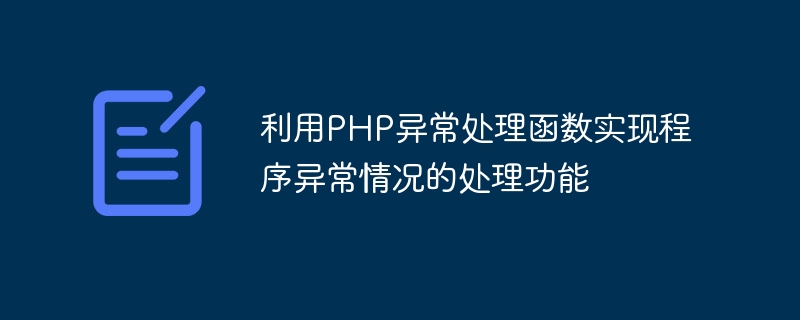

Use PHP exception handling function to implement program exception handling function
When writing PHP programs, we often encounter various abnormal situations, such as file not found , database connection failure, etc. In order to improve the robustness and reliability of the program, we can use PHP exception handling functions to capture and handle these exceptions.
PHP exception handling function includes three keywords: try, catch and finally. Among them, the try block is used to try to execute code that may throw an exception; the catch block is used to catch and handle thrown exceptions; and the finally block is used to execute some code that needs to be executed regardless of whether an exception occurs.
When using the PHP exception handling function, we can customize the exception class to represent different exceptions and include exception information when an exception is thrown. Using custom exception classes helps you better understand and handle exception situations. Next, we will use an example to illustrate how to use PHP exception handling functions to implement program exception handling functions.
Suppose we have a program that reads a data file and inserts the data into the database. We first need to write a custom exception class to represent the exception that the file cannot be found:
class FileNotFoundException extends Exception { public function __construct($message = "File not found", $code = 0, Exception $previous = null) { parent::__construct($message, $code, $previous); } }
Next, we write a function to read the file data:
function readDataFromFile($filename) { if (!file_exists($filename)) { throw new FileNotFoundException("File $filename not found"); } // 读取文件的数据并返回 ... }
In this function, if the file cannot be found, we throw a FileNotFoundException exception with exception information.
Then, we write a function to insert data into the database:
function insertDataIntoDatabase($data) { // 连接数据库 $conn = new mysqli("localhost", "username", "password", "database"); if ($conn->connect_error) { throw new Exception("Database connection failed: " . $conn->connect_error); } // 插入数据到数据库 ... }
In this function, if the database connection fails, we throw a general exception with Exception information.
Finally, we write a main function to call the above two functions and handle exceptions that may occur:
function main() { try { $data = readDataFromFile("data.txt"); insertDataIntoDatabase($data); echo "Data insertion successful"; } catch (FileNotFoundException $e) { echo "Error: " . $e->getMessage(); } catch (Exception $e) { echo "Error: " . $e->getMessage(); } finally { // 执行一些无论异常是否发生都需要执行的代码 ... } } main();
In the main function, we use a try block to try to execute reading the file and Database insert operation, and catch and handle various exceptions in the catch block. Regardless of whether an exception occurs, the code in the finally block will be executed.
Through the above examples, we can see that using PHP exception handling functions can easily implement the processing function of program exceptions and improve the reliability and robustness of the program. In actual development, we can flexibly use PHP exception handling functions to write robust programs based on specific exception situations and needs.
The above is the detailed content of Use PHP exception handling functions to implement program exception handling functions. For more information, please follow other related articles on the PHP Chinese website!